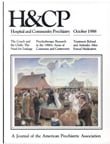A Video-Based Program to Educate High School Students About Serious Mental Illness
Abstract
The video-based educational program was well received by both teachers and students. Teachers said they would use the videotape and curriculum supplement again, and students wanted even more detailed information about mental illness and its effects on families. The results of the study demonstrate that the program had significant short-term impact on the knowledge and opinions of adolescents in a school setting.
The findings suggest that video-based instruction may hold considerable promise for increasing mental health knowledge and encouraging more sensitive attitudes about mental illness among adolescents. The preliminary assessment of the program's effectiveness indicates that mental health knowledge is more effectively taught when it is presented from the perspective of the group targeted for the educational exposure and that emotional and personal reactions to mental illness should be presented along with cognitive information.
However, because the assessment of this intervention was limited in scope, further work in additional schools and with larger numbers of students is needed to assess the relevance and applicability of the program for students of different educational levels, social classes, and ethnic backgrounds. Follow-up examination is also needed to determine whether the differences in knowledge about mental illness found to occur between the experimental and control groups would continue over time. Perhaps the most important area for further analysis is the actual effect of this educational intervention on adolescents who are themselves coping with the stress of having a mentally ill relative.
Access content
To read the fulltext, please use one of the options below to sign in or purchase access.- Personal login
- Institutional Login
- Sign in via OpenAthens
- Register for access
-
Please login/register if you wish to pair your device and check access availability.
Not a subscriber?
PsychiatryOnline subscription options offer access to the DSM-5 library, books, journals, CME, and patient resources. This all-in-one virtual library provides psychiatrists and mental health professionals with key resources for diagnosis, treatment, research, and professional development.
Need more help? PsychiatryOnline Customer Service may be reached by emailing [email protected] or by calling 800-368-5777 (in the U.S.) or 703-907-7322 (outside the U.S.).



